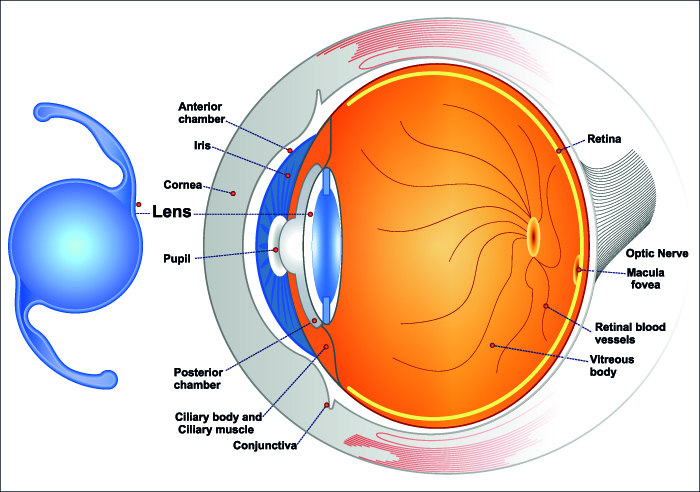IOL Surgery Treatment & Diagnostics in Karol Bagh, Delhi
IOL Surgery
IOL or Intraocular Lens is a synthetic lens that acts as a replacement for the natural lens of your eyes. It restores the focusing power of the natural lens. IOL Surgery is effective for treating cataracts. Visit an ophthalmologist near you to get the details about the treatment and the associated benefits and complications.
What is IOL Surgery?
Your eyes have a lens behind the pupil made up of proteins and water. The lens focuses the light on the retina, received by the brain. Due to old age, the proteins in the lens change, turning your lens cloudy. This condition is called cataract. IOL Surgery replaces the natural lens with an artificial lens to improve your vision. An ophthalmologist in Delhi will guide you about the best treatment for cataracts.

Who qualifies for IOL Surgery?
You will be eligible for IOL Surgery under the following conditions:
- You must not suffer from an auto-immune disease.
- You must have a normal retina.
- You must not have macular degeneration.
- You must have the usual sizes of the pupil and the iris.
- You must not have any problem with the posterior part of the eye.
Why is IOL Surgery conducted?
This surgery is highly effective in treating cataracts. Since it removes the natural lens and implants artificial lens, it is a permanent surgical procedure.
What are the different types of IOL?
There are many types of Intraocular Lens:
- Monofocal IOL - This implant is not flexible, so it focuses only on either the far-off object or nearby object.
- Multifocal implants - It acts like a bifocal lens, hence focuses on nearby and faraway objects.
- Accommodating IOL - It is flexible and hence, works like your natural lens to focus on more than one kind of distance.
- Toric IOL - This lens helps reduce astigmatism and you won’t need glasses after the surgery.
When do you need to see a doctor?
If you suffer from blurred vision due to old age, visit an ophthalmologist near you. The doctor will diagnose cataract and suggest suitable treatment.
Request an appointment at Apollo Spectra Hospitals, Karol Bagh, New Delhi. Call 1860 500 2244 to book an appointment.
How do you prepare for ICL Surgery?
The ophthalmologist will measure your eyes and corneal curve to check the right implant for your eyes. You will get eye drops to reduce the risks of inflammation and infection in the eyes. You must not wear contact lenses for a while before the IOL Surgery.
How is IOL Surgery conducted?
The ophthalmologist numbs your eyes with local or general anesthesia. An incision through the cornea helps him/her to get to the lens. The surgeon breaks the lens into pieces and removes it bit by bit. A natural eye lens is replaced by an intraocular lens implant. The cut heals itself without any stitches.
After the surgery, you will have to wear protective glasses. Your doctor will prescribe eye drops to prevent inflammation and infection. You must wear a shield for a while after the surgery to avoid rubbing your eyes and putting pressure on your eyes. A follow-up routine after the surgery is necessary to check your eyesight regularly.
What are the benefits?
There are many benefits of IOL Surgery that include:
- Permanent treatment
- Quick recovery
- Less painful
- Suitable for those who cannot undergo laser eye surgery
What are the risks?
Although IOL Surgery is a safe procedure, there are some risks associated with it, like:
- Retinal detachment
- Loss of vision
- Dislocation of implant
- After-cataract
Conclusion
IOL Surgery is an effective surgery to treat cataracts. Avoid any strain or pressure on your eyes before and after the surgery. IOL Surgery allows quicker recovery and better results than laser surgery. You must take only those medications prescribed by the ophthalmologist near you.
IOLs are permanent lenses that don't break. They remain persistent throughout the life of a patient.
Usually, IOL surgery offers 20/20 vision if you are not suffering from any other condition. In the case of glaucoma, you might observe a decline in the quality of eye vision.
Multifocal lenses are effective in treating uncorrected near and far vision by adjusting power for varying distances. But it can sometimes result in halos or glares, not observed in monofocal lenses.
After the IOL Surgery, you must take a protein-rich diet. Your meal must include carrots, broccoli, cauliflowers, sprouts, sweet potatoes, cabbage, etc.
Symptoms
Our Top Specialities
NOTICE BOARD
CONTACT US
CONTACT US
 Book Appointment
Book Appointment


.svg)
.svg)
.svg)
.svg)








